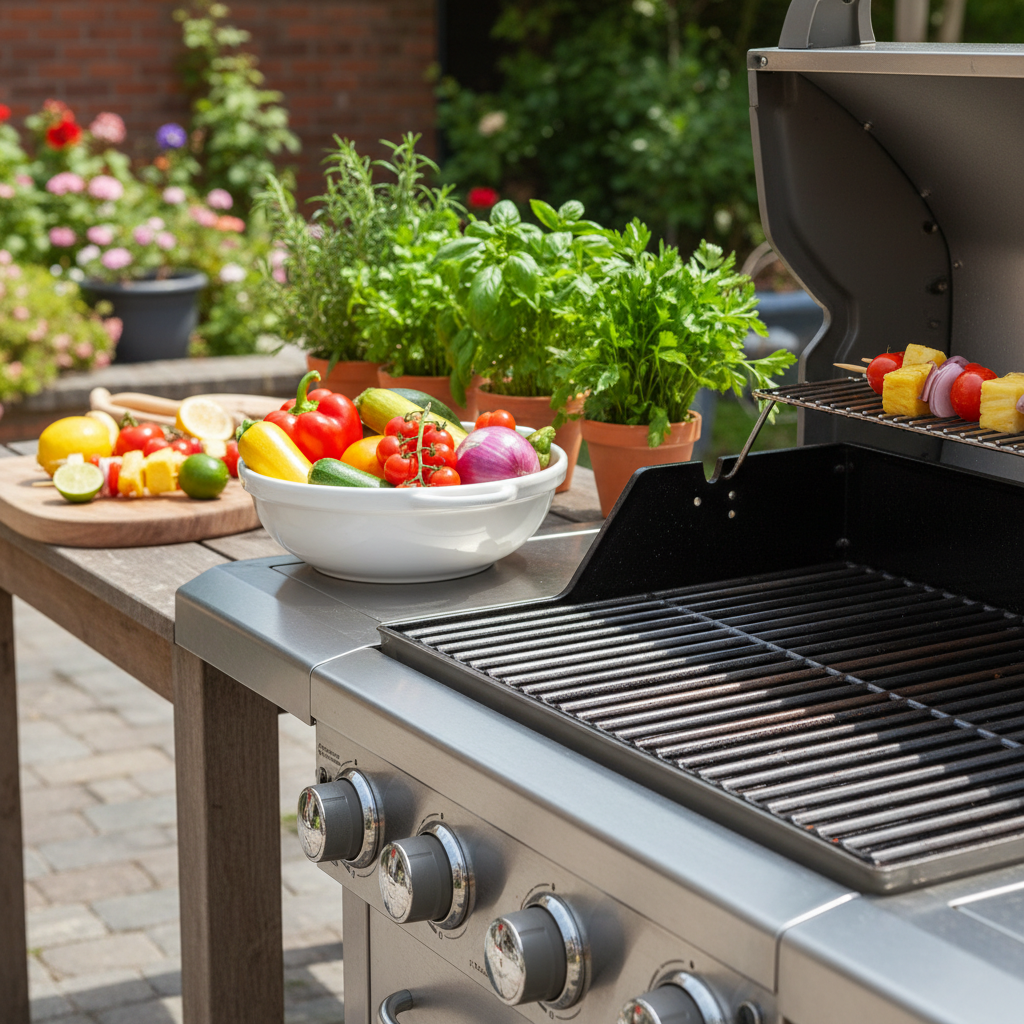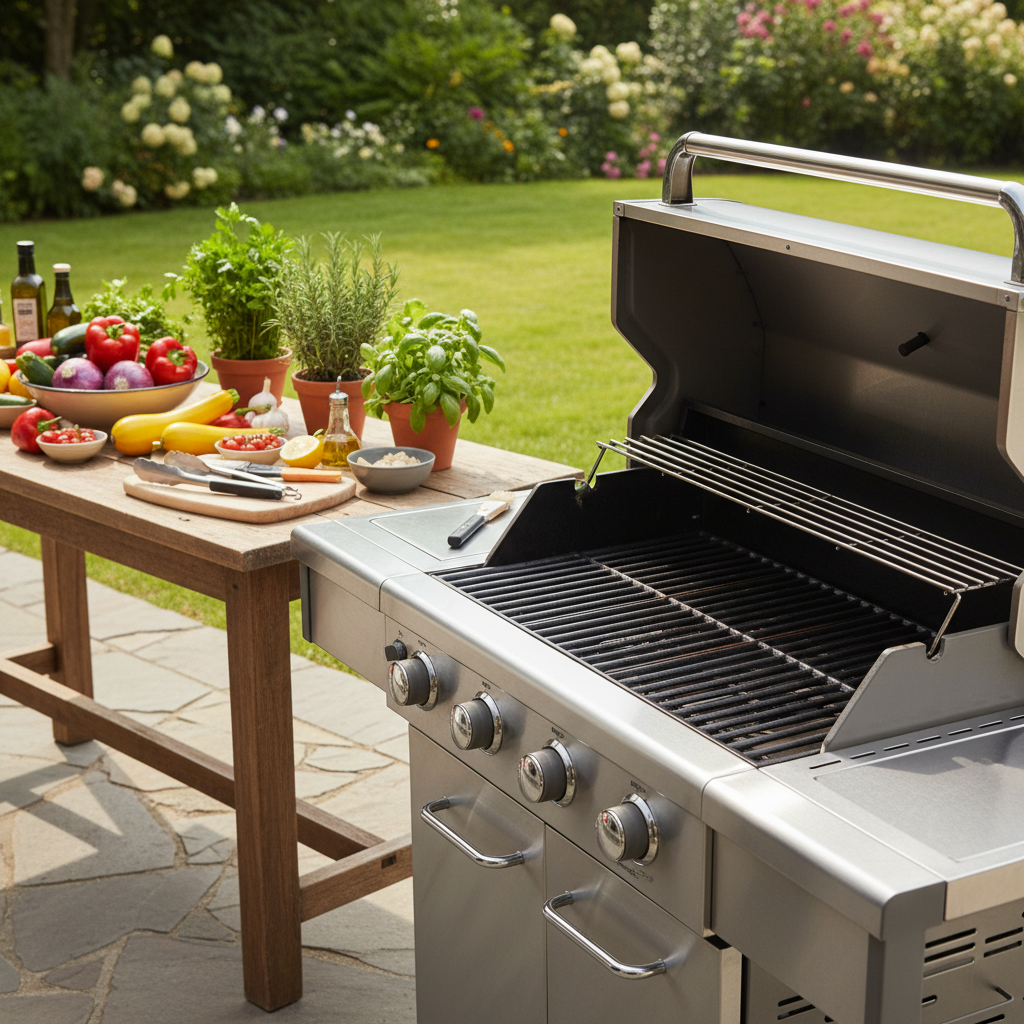
The Safest BBQ Cleaners for Food-Contact Surfaces
Introduction: Grill Smart, Eat Safe

There’s nothing quite like the sizzle of a perfectly grilled meal. But before you fire up your barbecue, an essential question arises: are your grill’s food-contact surfaces truly clean and safe? Using the wrong cleaning products or methods can leave behind harmful chemical residues that compromise both your health and the flavor of your food. At BBQCleaner.com, we believe a safe grill is a happy grill. This comprehensive guide will walk you through the safest BBQ cleaners for food-contact surfaces, ensuring your grilling experience is both delicious and worry-free.
Why Food-Contact Safety is Paramount
When we talk about “food-contact surfaces,” we’re primarily referring to your grill grates, but it also extends to any part of the grill that food might touch directly, such as warming racks or rotisserie spits. The safety of these surfaces is non-negotiable for several reasons:
- Health Implications of Chemical Residues: Many conventional grill cleaners contain strong chemicals like lye or harsh degreasers. While effective at cutting through grease, if not thoroughly rinsed, these residues can transfer to your food during cooking. Ingesting these chemicals can lead to digestive issues, irritation, or more serious health concerns over time.
- Flavor Contamination: Even if not harmful, residual cleaning agents can impart unpleasant tastes and odors to your food, ruining your culinary efforts. No one wants their steak to taste like industrial cleaner.
- Longevity and Performance of Your Grill: While less about immediate food safety, using inappropriate cleaners can damage your grill’s materials, such as corroding stainless steel or stripping the seasoning off cast iron grates, leading to premature wear and tear.
Choosing the right cleaning agents and diligently following safe practices are crucial steps in protecting your family’s health and enjoying the true taste of your barbecue.
Understanding Your Cleaning Options
When it comes to cleaning food-contact surfaces, your options generally fall into three categories: mechanical cleaning, natural/DIY solutions, and commercial cleaners.
Mechanical Cleaning: The First Line of Defense
Mechanical cleaning involves physical removal of debris and baked-on grime. This is often the safest and most effective first step for food-contact surfaces.
- Bristle-Free Brushes: These are paramount for safety. Traditional wire brushes can shed bristles, which can then stick to your grill grates and accidentally be ingested. Opt for Safe Grill Brushes (Bristle-Free) or a Grill Rescue Brush (bristle-free) made with coiled wire, nylon, or other bristle-free designs.
- Grill Scrapers: A good Safe Scrub Wooden Grill Scraper or a heavy-duty stainless steel scraper can effectively remove larger charred bits without chemicals.
- Grill Cleaning Stones/Bricks: These abrasive blocks, like a Grill Cleaning Stone or pumice stone, wear down as you use them, conforming to the shape of your grates and providing a powerful, chemical-free scrub.
Natural & DIY Food-Safe Cleaning Solutions
For truly food-safe cleaning, natural ingredients are often your best bet. They are effective, inexpensive, and pose no risk of toxic residue.
- Baking Soda & Vinegar: This classic duo is a powerhouse. Create a thick paste with Food-Grade Baking Soda and a small amount of water. Apply it liberally to cool grates, let it sit for 20-30 minutes, then spray with Cleaning Vinegar. The fizzing action helps lift stubborn grease. Scrub with a bristle-free brush and rinse thoroughly.
- Hot Water & Dish Soap: For general grease and grime, a good soak in hot water with a few drops of dish soap can work wonders. For tough grease, consider using a product like Dawn Powerwash Heavy Duty Dish Spray. After soaking and scrubbing, the most critical step is to rinse the grates *extremely* well with clean, hot water to remove all soap residue.
- Steam Cleaning: If your grill allows, high-temperature steam can loosen tough grime without chemicals. Some grills have steam cleaning functions, or you can use a dedicated steam cleaner.
Commercial Cleaners for Grates and Surfaces (with caveats)
While many commercial cleaners exist, very few are truly “food-contact safe” without rigorous rinsing. When choosing a commercial product for your grates, look for those specifically designed for grills and always prioritize thorough rinsing.
* Grill-Specific Sprays: Some products, like Goo Gone Grill & Grate Cleaner or Weber Grill Cleaner Spray, are formulated to be tough on grease but are often less caustic than oven cleaners. They still require meticulous rinsing. Always read the label for instructions regarding food-contact surfaces.
* Avoid General Oven Cleaners: Unless explicitly stated on the product that it’s safe for grill grates and you can rinse them perfectly, it’s best to avoid harsh oven cleaners on parts where food will directly touch. Their strong chemical composition can be very difficult to remove entirely.
A Step-by-Step Guide to Safe Grill Cleaning
Follow this process for a safe and sparkling clean every time:
1. Preparation: Ensure your grill is completely cool. Remove the grates and any drip trays or heat deflectors.
2. Initial Scrape/Brush: Use your bristle-free brush or scraper to remove as much loose food debris and char as possible.
3. Apply Cleaner:
* For natural methods: Apply your baking soda paste, or soak grates in hot, soapy water.
* For commercial cleaners: Spray the cleaner evenly over the grates, following the product’s dwell time instructions.
4. Scrubbing: Use your bristle-free brush or grill cleaning stone to scrub away baked-on grease and grime. For stubborn spots, reapply cleaner and let it sit longer.
5. CRITICAL: Rinsing Thoroughly: This is arguably the most important step for food-contact surfaces. Rinse the grates with a strong stream of hot water until *all* signs of cleaner, suds, or residue are gone. For extra assurance, wipe down with clean Microfiber Cleaning Towels and rinse again.
6. Drying & Reassembly: Allow the grates to air dry completely, or dry them with a clean towel. For cast iron grates, consider a light re-seasoning with cooking oil to prevent rust. Reassemble your grill.
Beyond Cleaning: Grill Maintenance for Safety & Longevity
Proactive maintenance significantly reduces the need for heavy-duty cleaning and enhances safety.
* Clean After Every Use: A quick scrape with your bristle-free brush while the grill is still warm (but not scorching hot) prevents most build-up.
* Use Drip Pans: Placing Disposable Drip Tray Liners under your grates catches grease and food drippings, making cleanup much easier and preventing flare-ups.
* Protect with a Grill Cover: A good Grill Cover shields your grill from the elements, reducing rust and grime build-up over time.
Frequently Asked Questions About Safe Grill Cleaning
1. Is it safe to use oven cleaner on my grill grates?
While powerful, it is generally NOT recommended for grill grates that come into direct food contact unless the product specifically states it’s safe for grill grates AND you can rinse them absolutely perfectly. Oven cleaners contain very harsh chemicals that are extremely difficult to remove entirely, posing a significant health risk if ingested.
2. How often should I deep clean my grill for food safety?
Beyond a quick scrape after each use, a thorough deep clean of your grates and internal components is recommended at least 2-3 times during grilling season, or more frequently if you grill often or cook greasy foods. At the very least, perform a deep clean at the beginning and end of each season.
3. What should I look for in a “food-safe” commercial grill cleaner?
Look for products explicitly labeled “food-safe,” “non-toxic,” or “biodegradable,” and those specifically designed for grill grates. Always read the instructions carefully, paying close attention to rinsing requirements. When in doubt, natural solutions like baking soda and vinegar are the safest bet for food-contact surfaces.
4. Are wire brushes really that dangerous?
Yes, traditional wire bristle brushes can be dangerous. The bristles can break off, stick to your grill grates, and accidentally transfer to food, leading to severe internal injuries if ingested. Always opt for bristle-free grill brushes, grill scrapers, or cleaning stones instead.
5. Can I use plain water to clean my grill?
Plain hot water is effective for loosening fresh grime and can be used with a good scrub brush. However, for baked-on grease and carbon buildup, plain water alone usually isn’t enough. It works best in conjunction with mechanical scrubbing or a natural cleaning agent.
This post contains affiliate links, which means we may earn a small commission if you make a purchase through these links, at no extra cost to you.
